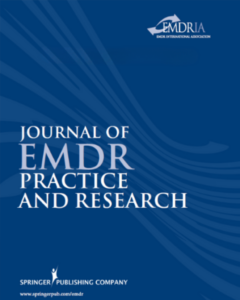Plasma brain-derived neurotrophic factor level may contribute to the therapeutic response to eye movement desensitization and reprocessing in complex post-traumatic stress disorder: A pilot study (Acta Neuropsychiatrica, 2012)
Investigating the relationship between plasma levels of brain-derived neurotrophic factor, nerve growth factor, and EMDR in complex PTSD.
Read MoreEvaluating the Effect of Eye Movements on Positive Memories Such as Those Used in Resource Development and Installation (Journal of EMDR Practice and Research)
Study found that the effectiveness of bilateral stimulation in resource development and installation (RDI) is questionable.
Read MorePretreatment, Intratreatment, and Posttreatment EEG Imaging of EMDR: Methodology and Preliminary Results From a Single Case (Journal of EMDR Practice and Research)
Electroencephalography (EEG) was used to monitor neuronal activation during the whole EMDR session, including the autobiographical script.
Read MoreReducing vividness and emotional intensity of recurrent “flash-forward” by taxing working memory: An analogue study (Journal of Anxiety Disorders)
This study examined whether eye movements affect recurrent, intrusive visual images about potential future catastrophes (“flashforwards”) in a sample of female undergraduates.
Read MoreDo horizontal saccadic eye movements increase interhemishpheric coherence? Investigation of a hypothesized neural mechanism underlying EMDR (Frontiers in Psychiatry)
This study aimed to investigate whether memory enhancement following bilateral eye movements is associated with increased interhemispheric coherence in the electroencephalogram (EEG).
Read MoreTraitement du souvenir dépendant du sommeil et mode d’action de l’EMDR (Journal of EMDR Practice and Research)
On pense que l’efficacité particulière de l’EMDR (désensibilisation et retraitement par les mouvements oculaires) dans le traitement de l’état…
Read MoreEMDR: Eye movements superior to beeps in taxing working memory and reducing vividness of recollections (Behaviour Research and Therapy)
Study compares auditory and eye movement BLS, supports a working memory account of EMDR, and suggests that the effects of beeps on negative memories are inferior to those of eye movements.
Read MoreThe efficacy and psychophysiological correlates of dual-attention tasks in eye movement desensitization and reprocessing (EMDR) (Journal of Anxiety Disorder)
Findings indicate that eye movements in EMDR are beneficial & distinct psychophysiological changes may aid in processing negative memories.
Read MoreAutobiographical memories become less vivid and emotional after eye movements (British Journal of Clinical Psychology)
After eye movements, but not after the other interventions, negative memories became less negative & positive memories became less positive.
Read MoreHorizontal rhythmical eye-movements consistently diminish the arousal provoked by auditory stimuli (British Journal of Clinical Psychology)
Testing if orienting reflex is an explanatory mechanism in EMDR and whether EMDR effects are due to a distraction effect.
Read MoreEmotionality of Loss-Related Memories Is Reduced After Recall Plus Eye Movements But Not After Recall Plus Music or Recall Only (Journal of EMDR Practice and Research)
Sixty undergraduate students participated in a study, concluding that eye movements are effective when negative memories pertain to loss and grief, suggesting possibilities for treatment intervention in individuals suffering from complicated grief.
Read MoreCortisol response following exposure treatment for PTSD in rape victims (Journal of Aggression, Maltreatment & Trauma)
Changes in salivary cortisol levels in adult female rape victims with PTSD, assigned to either prolonged exposure therapy or EMDR.
Read More


